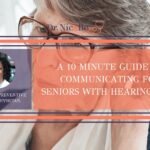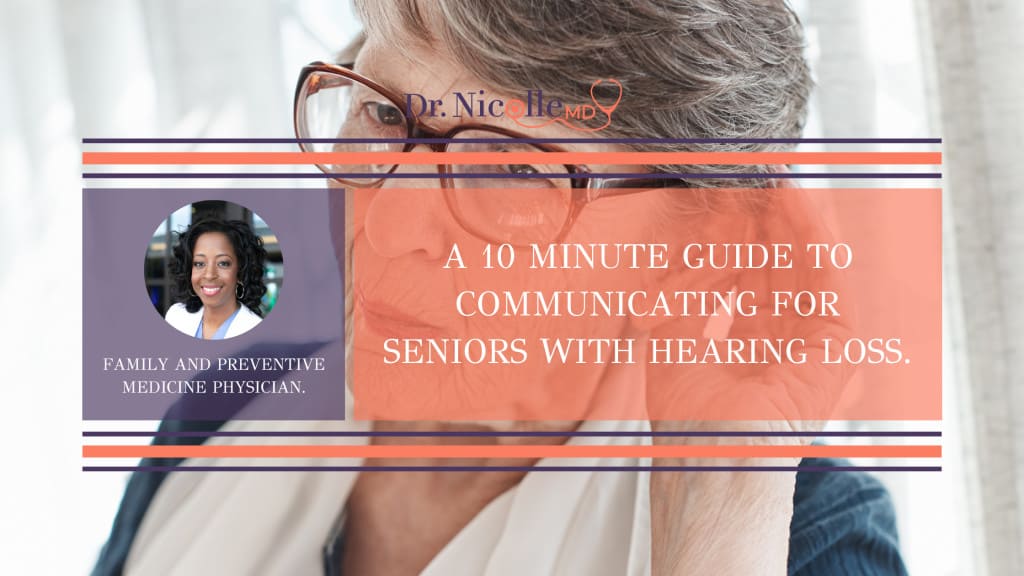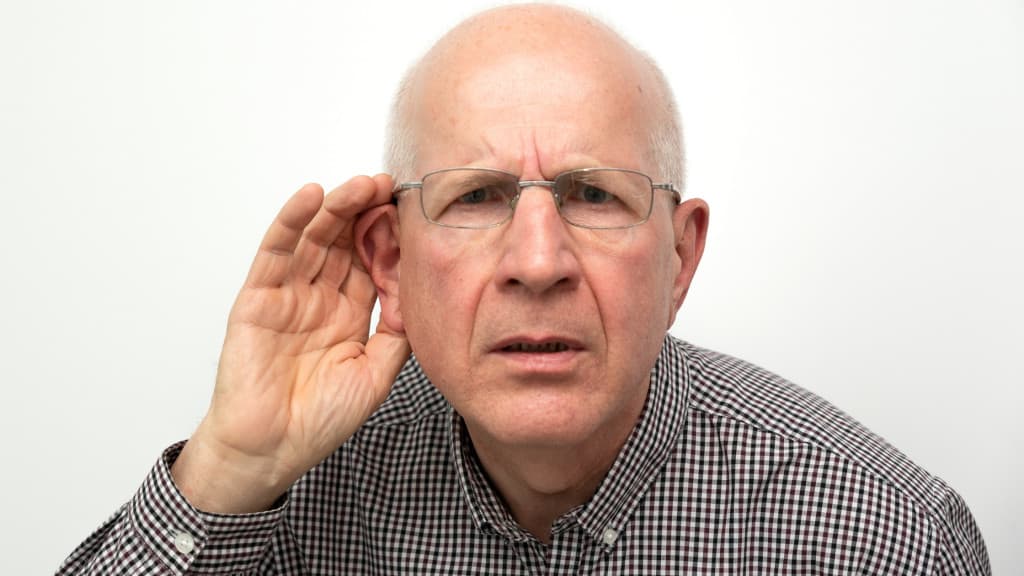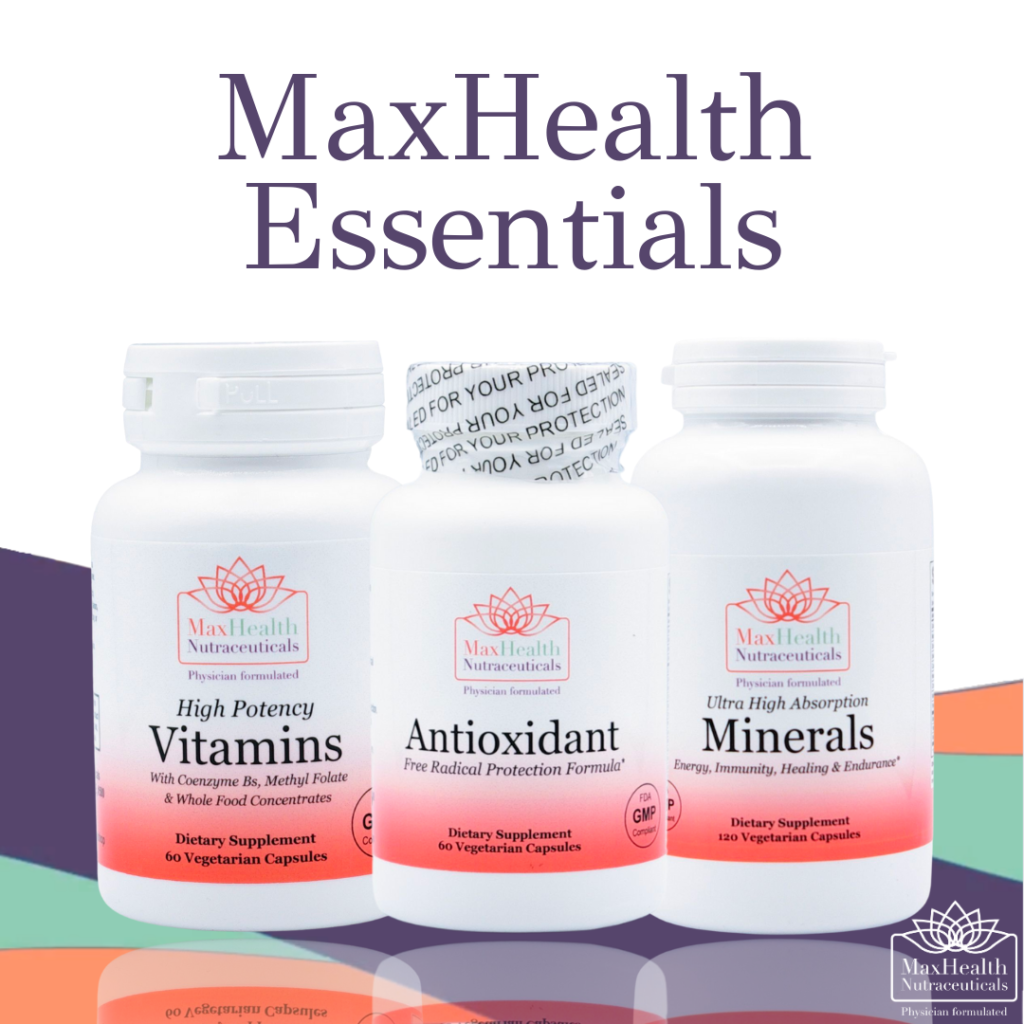

It’s Wellness Wednesdays! I’ll give you a 10 minute guide to communicating to seniors with hearing loss. Hearing loss can make you feel isolated and rob you of many of life’s pleasures. It’s a real issue for seniors. According to the National Institutes of Health, one in three adults between 65 and 74 has hearing loss, and that figure rises to almost 50% for those over 75.
At the same time, there’s promising research underway, and assistive devices have made a lot of progress. Scientists may someday be able to reverse hearing loss by replacing damaged hair cells in the inner ear or prevent age-related hearing difficulties altogether with breakthrough medications.
Until that happy day, you’ll need to rely on the available technology and strategic communication skills. Start by taking a look at these tips for coping with reduced hearing.

Communicating with Hearing Loss – General Conversation Tips:
1. Face off. Ask others to face you when they’re talking. It also helps if they give you a heads up by calling out your name before they start.
2. Repeat it back. Active listening is even more important when you have hearing loss. Reiterate what you think you heard to see if you’re correct. It’s more pleasant and effective than saying “excuse me” over and over.
3. Rephrase it. Simple language helps. Shorten sentences, and break information down into bite-size chunks.
4. Stay on track. It’s easier to understand a message when you know the context. Announce the subject matter first. Stick to one topic or let your listener know if you’re switching your focus from home repair to vacation plans.
5. Resist shouting. A moderate volume and pace creates the most favorable conditions. Yelling distorts the face, and makes it harder to see nonverbal cues.
6. Write it down. Put essentials into writing. That’s especially true for names and numbers like street addresses or contact information.
7. Read lips. Lip reading is a skill you can start learning at any age by paying attention to lip shape and movement. Sign up for local classes or browse for resources online. It may take one or two years to master, but eventually you could find yourself putting on your glasses to talk.
8. Use devices. There are many options today from smart hearing aids to personal amplifiers. Try them out before buying anything.

Communicating with Hearing Loss -Tips for Specific Situations:
1. See your doctor. Bring your spouse or other loved ones with you to health care appointments. They can help you gather information while you discuss ways for your family to deal with your hearing loss.
2. Talk by phone. Hearing-aid-compatible or captioned phones can help you keep in touch with friends and family. If you’re on a tight budget, you may qualify for free equipment.
3. Visit with grandchildren. The same conversation tips apply to children, but they may have more difficulty remembering what to do. Be patient, and hold onto your sense of humor.
4. Watch movies. Theatres have been required to provide assistive devices for years, and now recent court decisions and digital technology are bringing captioned movies to more venues. Soon you’ll be able to talk about new films instead of waiting to see them at home.
5. Dine out. Loud noises can become more irritating when you have hearing loss, so you may want to ask about the sound level before making reservations. You can also choose a quiet table away from the entrance and kitchen.
Hearing helps us to communicate and stay safe. To protect your ears, minimize your exposure to loud and sustained noises. To deal with the hearing loss you’ve already developed, count on lifestyle changes and assistive devices that can maximize your senses and enhance your quality of life.
I would love to give you a free resource sheet to support your overall wellness. Click the button below to receive your gift.
I really wanted to talk about this topic today because your natural health and wellness is important. You can adopt healthy lifestyle practices that improve your health, your environment, and enrich your life, which can in turn improve the lives of those close to you. You have the power to break the cycle of poor health, including chronic disease, so that you can leave a legacy of health to your loved ones.
I use functional medicine and lifestyle medicine as the first line of treatment, before medications, to treat lifestyle-related chronic diseases. Lifestyle-related chronic diseases include diabetes, hypertension, obesity, and some cancers, just to name a few. Lifestyle practices, such as eating a whole-food plant-based diet and regular physical activity, can help you lose weight, reverse some chronic diseases (if you suffer from them), and can even help you with detoxification. In certain cases, these approaches may even outperform pharmaceutical therapy.
But I always tell my patients that conventional medications may be appropriate at this time to prevent catastrophic illness, but over time, you can work to make the necessary lifestyle changes to possibly reduce and/or eliminate medications. Please remember to always consult your physician for your particular needs and circumstances prior to making any decisions whatsoever.
Is Dietary Supplementation Right For You?
For some people, vitamin and mineral supplements offer important health benefits. Supplements are designed to fight deficiencies found in our diet and complement the food we eat regularly. Supplements are basically “helping hands” to our daily food.
If you suspect that you aren’t getting the nutrients you need, consider shifting your focus from supplements to eating better.
But it is very important to note that we are not eating the same foods we ate years ago because the soils have been depleted of critical nutrients through current industrial farming practices. And because the soil is not as good as it used to be, the food supply (grown from the depleted soil) is not as good as it used to be. For example, you are not getting the same levels of magnesium as you would have gotten 30 or even 50 years ago.
Second, much of the food has been genetically altered, which can impact the inherent and unique nutritional composition that each food possess. For example, ancient einkorn wheat has less gluten, more protein, more Vitamin A, and more beta carotene, than modern genetically modified wheat.
Third, the toxic load in the environment today is much higher than 100 years ago. We can see this with global warming, toxic landfills, polluted oceans and waterways, etc. Toxicity levels interfere with nutrient assimilation and absorption not just into the foods, but into our bodies as well.
So… if you are unable to eat better, the supplements in my MaxHealth Essentials Bundle may provide the extra boost you need.
These are my favorite Wellness and Immune-Boosting Supplements to use! This MaxHealth Essentials Bundle will ensure you have the intake of the important vitamins, minerals, and antioxidants to decrease inflammation and boost your innate wellness day and night. Taken together, it’s a solid plan for increasing your body’s natural resiliency.
For best results make sure you use the supplements with dietary changes including a whole food plant-based diet, regular exercise (at least 2-3x per week), regular sleep (8 hours per night), and intermittent fasting (at least 1-3x per week).
Weight Monitoring
Since weight management is very important in combatting chronic diseases, I recommend that you be mindful of your weight and its fluctuations, and that you monitor your weight AT LEAST on a weekly basis. I recommend a scale that includes a body composition monitor (*this scale cannot be used with a pacemaker or other implanted devices).
Physical Activity
Physical activity (or exercise) can improve your health and reduce the risk of developing several chronic diseases like high blood pressure, type 2 diabetes, and cancer, just to name a few. Physical activity can improve your mood, boost your immune system, help you maintain a healthy weight, and is a great way to detox your body!
I often recommend yoga and resistance training for physical activity, but as you are aware, there are plenty of forms of “movement” that you can do! But for the basics, especially if you’re just getting started, yoga and resistance training are where I would start.
Yoga
Yoga can be a great way to improve your strength and flexibility, manage your stress, improve your heart health, and lose weight! I recommend using a grounded yoga mat to connect yourself with the earth and reduce inflammation.
Resistance Training
Resistance training is the mainstay for overall health. It not only has beneficial effects on reducing body fat, it also increases muscle size and strength. Check out some basic dumbbells/free weights that I recommend to everyone.
Another alternative for dumbbells/free weights are resistance bands. They are great for physical therapy, yoga, strength training, and excellent for traveling.
Remember, living a healthy lifestyle including eating a whole foods plant-based diet, regular physical activity, and reducing stress are the best ways to maintain a healthy weight. Let me know what you think in the comment section below.
Dr. Nicolle Martin
Some of the links in this article are "affiliate links", a link with a special tracking code. This means if you click on an affiliate link and purchase the item, we will receive an affiliate commission.
The price of the item is the same whether it is an affiliate link or not. Regardless, we only recommend products or services we believe will add value to our readers.
By using the affiliate links, you are helping support our Website, and we genuinely appreciate your support.
Last updated on December 14th, 2021 at 04:18 am

Minimize Medications. Maximize Health.
Are you super busy but need to take control of your health? Are you tired of being tired? Subscribe to my “Minimize Medications, Maximize Health Blog” and I’ll give you 7 Tips to Get Healthy in No Time absolutely FREE.






